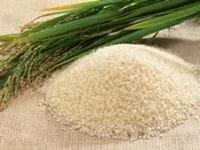Take a drive around rural Ghana and large swathes of the country appear green and fertile.
So you might then wonder why Ghanaians spend between $200 and $300 a year on imported rice.
The current supply of local rice is less than a third of the demand but there is potential for a green revolution here. And as international rice prices escalate, experts say the time is right.
"I believe if we used just 1% of what we spend in a year on importing rice to build up our own rice industry we could be self sufficient," says Kofi Dartey of Ghana's Crop Research Institute, based in Kumasi.
A two-hour drive away near the town of Ejura, rice farmers are comparing notes and planning a strategy to boost their yields now that the rains have started.
Sitting outside the district agricultural headquarters, their immediate danger comes from above - mangoes are dropping from the tree at an alarming rate and someone is soon going to get a bruise.
Kofi Dartey is working with the farmers to develop a new rice seed which has been hailed as the answer to Africa's rice shortfall.
New Rice For Africa (Nerica) was developed less than 10 years ago and is a hybrid combining the higher yielding Asian and the hardy African seeds.
As Kofi Dartey produces several plastic bags of different seeds, the farmers closely inspect them, even taking a nibble to check the quality.
"The rice is very good. If you chop [eat] it, the taste is good.
"The children love it because it tastes sweet," says Samuel Uunuu, who planted the hybrid seeds last season.
At 33, he is one of the youngest farmers around.
But the farmers note that unless fertiliser is used, Nerica yields are very low.
With the price of imported fertilisers increasing as a result of the cost of oil plus the need for herbicides, many of the farmers are not yet convinced that the green revolution is coming.
Escape from poverty
Three shiny 4x4 vehicles turn up with the US and Ghanaian flags emblazoned on them.
Remember when US President George Bush promised a five-year grant of more than $0.5bn to Ghana?
These vehicles funded by the Millennium Challenge Corporation are fruits of the package which is partly targeted at the agriculture sector.
At a signing ceremony in August 2006, the US promised that the investment would lift more than 500,000 poor Ghanaians out of extreme poverty and would lift over one million people out of poverty in total.
Almost two years since the deal was struck, farmers are still being identified for training.
The escape from poverty is clearly not happening at speed.
Rice farming is one potential area for investment but there are question marks over whether the US would really like to see Ghana become self-sufficient in rice.
After all, subsidised American rice is on sale throughout Ghana.
'Not impressed'
As the cars move on, I am taken to the district agricultural stores where storerooms are packed with sacks of the Nerica seeds - over 50 metric tonnes ready for the farmers to sow.
But at the local mill there are signs of some of the problems facing the agriculture industry.
The miller is fast asleep and outside a young woman is drying some maize flour on the concrete - walking all over it with her bare feet - this is not the most hygienic food preparation.
Once she has left, a goat comes along for a free lunch.
For the equivalent of around $2, the miller is woken up and a sack of last year's Nerica crop is poured into the small diesel fuelled machine.
What comes out of the shoot does not impress Kofi Dartey.
"Many of the grains are broken, there are still some husks amongst the rice, and for the Ghanaian market the grains are too short," he says.
It would seem that Nerica rice is still very much work in progress, but the Africa Rice Centre based in Benin aims to keep improving the seed.
'Hooked'
The competition is tough.
In Kumasi's central market there is no shortage of rice.
Women sit behind 50kg sacks of rice marked "Produce of Thailand" or "USA Grain".
Ghanaians in the cities seem hooked on the imported longer grain and prefer their aroma.
But their prices have gone up by around a third since the beginning of the year, so tastes may change and local rice could be on the rise.
There may be promises of aid and assistance for farmers, but Mr Dartey says the workforce needs a total change of attitude - an end to the mentality of waiting for help from outside to fix a problem.
In some cases he says Ghanaians are hungry because they choose to be hungry.
"The whole hunger problem is an attitudinal problem.
"You plant this, you have your harvest and you have your rice to eat.
"If you refuse to plant and you stay at home, you have no rice and you have no choice than to beg."
The potential in Ghana is huge, but working on the land is going out of fashion as people stream from the villages to the cities.
To solve the food problem someone will have to convince them that they'd be better off moving in the opposite direction.
Source: MJFM








